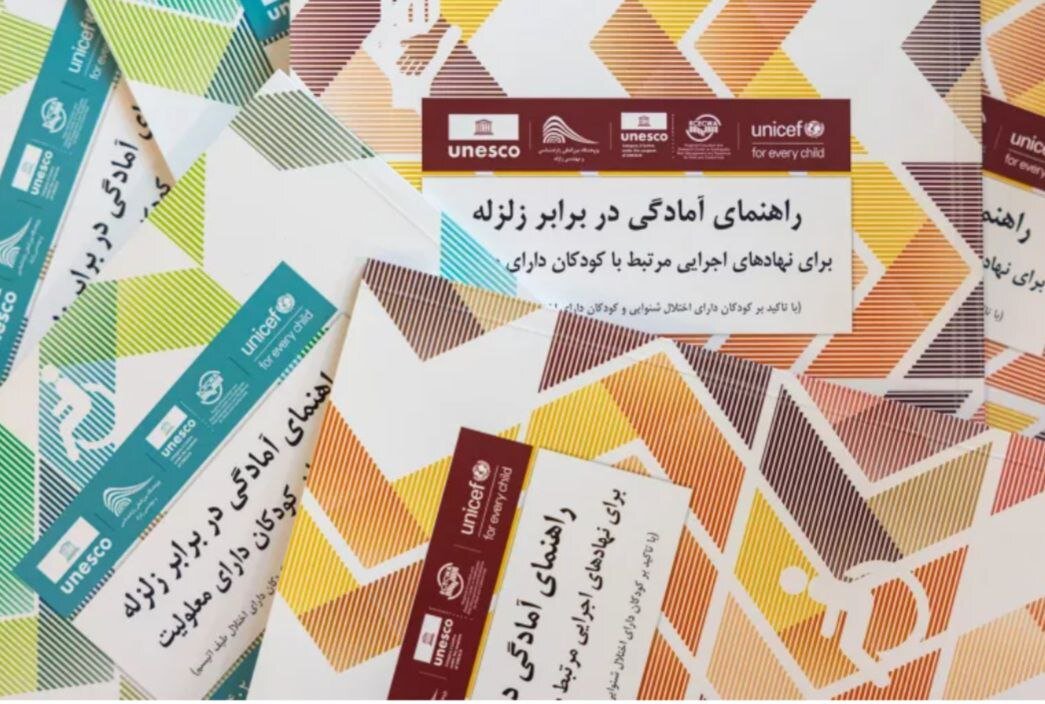UNICEF enhances emergency preparedness for children with disabilities
UNICEF enhances emergency preparedness for children with disabilities
TEHRAN – Under a globally unique program called ‘Earthquake Preparedness Education for Children with Disabilities’, the United Nations Children’s Fund (UNICEF) and its partners have developed three books each targeting different stakeholders, i.e. parents/caregivers of children with disabilities, teachers, and policymakers.

Throughout the books, UNICEF and the United Nations Educational, Scientific and Cultural Organization (UNESCO), in collaboration with the International Institute of Earthquake Engineering and Seismology (IIEES), offer guidelines on disaster management, including mitigation, preparedness, response, and recovery, focusing on children with hearing impairments, mobility impairments, and autism spectrum disorder so far, UNICEF website announced in a press release on January 19.
The development process of these books involved consultations with children with disabilities and their families, Organisations of Persons with Disabilities (OPDs), teachers from the Special Education Organization, social workers from the State Welfare Organization, and aid workers from the Iranian Red Crescent Society (IRCS).
Furthermore, four consultative training workshops were held, where teachers, social workers, and aid workers learned and provided feedback on strategies for supporting children with disabilities before, during, and after earthquakes.
Looking ahead, UNICEF Iran plans to work with its partners to mainstream these resources in the annual earthquake and safety drill organized each year in schools and develop an inclusive guideline for the drill.
As a first step, and for the first time, an earthquake and safety drill is planned to be organised at a special school for children with mobility disabilities, aiming to advocate for an inclusive drill, strengthen earthquake preparedness for children and gather feedback on the developed guidelines.
The program’s journey does not stop here. Plans are already underway to update the guidebooks to include guidelines for children with vision impairments and to expand the resources to address all types of disabilities. This initiative represents a significant leap towards inclusive earthquake preparedness, ensuring a safer and more resilient future for every child in Iran, regardless of their disabilities.
TOT workshop on Disability Inclusion
The IRCS held a training of trainers (TOT) workshop based on the UNICEF training package on ‘Disability Inclusion for Frontline Workers’.
Organized in cooperation with the International Committee of the Red Cross (ICRC), the two-day training of trainers pilot workshop was held at the IRCS physical rehabilitation center from September 8 to 9, 2024 in Tehran, the UNICEF website announced in a press release on September 26.
UNICEF Disability Inclusion Policy and Strategy (DIPAS) 2022-2030 is guided by the Convention on the Rights of Persons with Disabilities (CRPD), the Convention on the Rights of the Child (CRC), and the United Nations Disability Inclusion Strategy (UNDIS).
It stresses a more inclusive world by 2030 where all children, including those with disabilities, live in barrier-free and inclusive communities.
The two-hour session aimed to train professionals from IRCS in three provinces of Khorasan Razavi, Sistan-Baluchestan, and Tehran on best practices in early identification and referral of persons with disabilities.
The session included sensitizing participants on the appropriate attitudes towards persons with disabilities and their caregivers and familiarizing them with the concept of ‘Disability Inclusion’ and the importance of participation.
The overall training program aimed to ensure that people with disabilities, especially those in remote areas, are identified and referred to access rehabilitation services in a timely manner through IRCS Primary Rehabilitation Centers across the country.
Notably, persons with disabilities and their families were invited to share their experiences throughout the workshop, offering unique perspectives on the challenges faced by them. Their voices will help shape the way forward, reaffirming the principle: “Nothing about us without us.”
Following this workshop, participants from IRCS will conduct training sessions in their respective cities for IRCS selected volunteers in Helal Houses (IRCS community-based centers).
The pilot implementation will be the basis for designing the main TOT program for all provinces across the country in Quarter 1 of 2025.”
The DIPAS sets out six strategic priorities: prevention of stigma and discrimination; improvement of disability-inclusive services, programs, and workplaces; access to comprehensive community care and support services; access to assistive technology; disability-inclusive action in humanitarian, emergency, and fragile contexts; full and meaningful participation of persons with disabilities.
MT/MG
source: tehrantimes.com